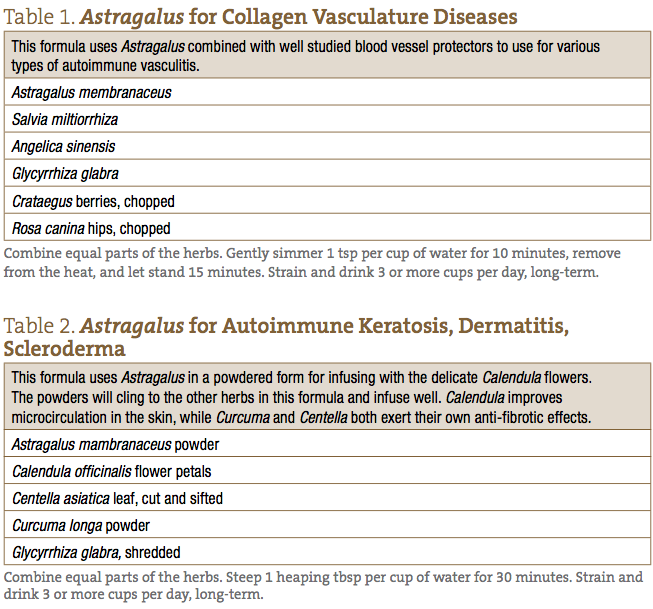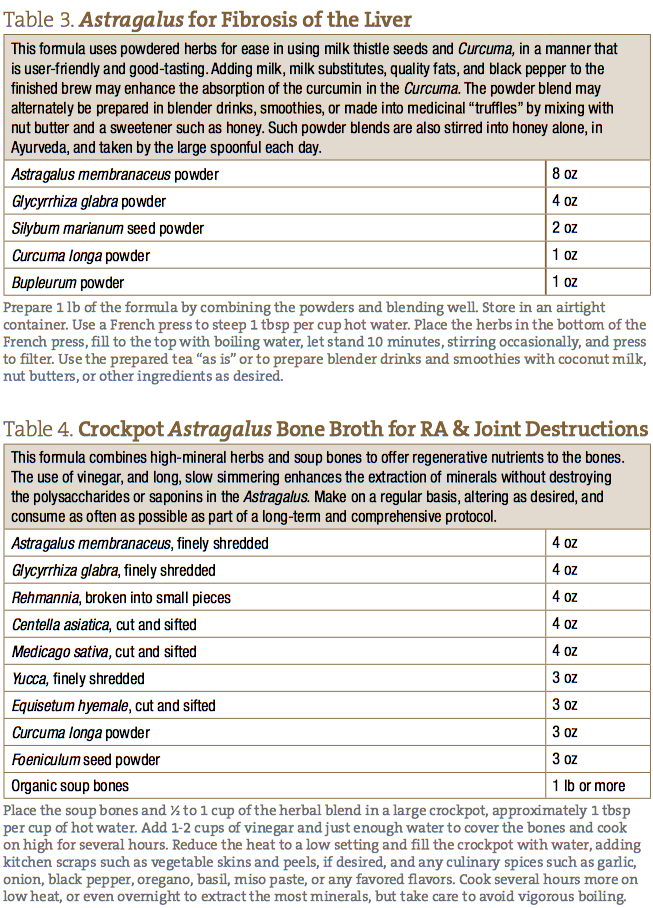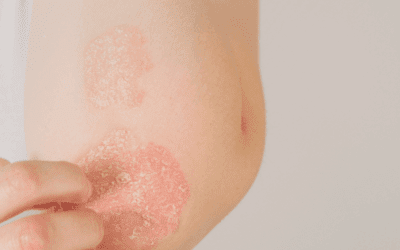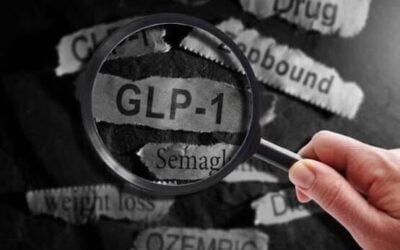Jillian Stansbury, ND
Astragalus membranaceus, going by the common names Huangqui in China, and milk vetch in the United States, is one of the most fundamental herbs used in Traditional Chinese Medicine. Astragalus roots have also been used as a medicinal food by slicing longitudinally and simmering in soups; and for culinary purposes, such as a thickening agent, by processing out the gummy sap (referred to as tragacanth gum); and for medicinal purposes, such as to soothe irritated intestinal mucosal membranes. Astragalus has been traditionally used to treat infections, immune deficiency states, and for “Kidney Yang Deficiency,” whose symptoms are similar to the western concept of adrenal insufficiency.1 Astragalus is a chi, or Qi, tonic, appropriate for improving energy, vitality, and longevity, and is included in the traditional Chinese herbal formulas, Qilong2 and Tangfukang capsules, and other traditional formulas for aging. As a longevity herb, Astragalus is highly regarded in the treatment of debility and poor stamina, menopause, and osteoporosis,3 as well as heart disease. Astragalus is also specifically use to treat fibrotic changes in the tissues, as can occur with numerous autoimmune diseases, including diabetes, nephritis, hepatitis, arthritis, and dermatitis.
The Amphoteric Actions of Astragalus on the Immune System
The immune-modulating properties of Astragalus might be considered to be “amphoteric,” meaning that the plant may boost immune responses (thus helping to treat infections and chronic immune issues), as well as reduce immune hypersensitivity in situations of allergy and autoimmune disease. Following are some of the current research studies in support of the use of Astragalus to treat a wide variety of allergic and autoimmune conditions, as well as some sample formulas in which to use this safe, versatile, and decent-tasting herb.
Astragalus membranaceus has demonstrated many immune-modulating actions4,5 through its antioxidant and anti-inflammatory effects on many different tissue types, including the skin, pancreas, liver, blood vessels, connective tissues, and neurons6; it has also demonstrated anti-tumor, anti-viral, anti-allergy, and anti-diabetic activities.7 More than 100 “active” compounds, including flavonoids, saponins, polysaccharides, and amino acids, have been identified in Astragalus thus far.8 The polysaccharide, triterpene, and its flavonoid fractions are all credited with immune-regulating actions.7 Among the most studied Astragalus constituents are the immune polysaccharides, including beta glucan and astragalin, and the saponins, referred to as astragalosides. Astragaloside IV is the primary pure saponin of Astragalus, and has been shown to be important to its cytokine and T-cell modulation effects, promoting T-helper cells toward a T-helper 1 (Th1) phenotype.9
The immune polysaccharides in Astragalus are of high molecular weight and not easily absorbed from the intestines, hence may trigger immune responses via direct effects on the intestinal mucosa and microbiota. Investigations with chicks show Astragalus to significantly increase beneficial Lactobacilli and Bacillus cereus numbers, while decreasing Escherichia coli numbers and lymphocyte responsiveness.10 Astragalus polysaccharides are also shown to promote proliferation and function of intestinal intraepithelial T cells – a group of specialized T cells in the gastrointestinal mucosa that may also have systemic immune modulating effects. Of various natural immune modulators tested, beta glucan – in Astragalus and other plants – is consistently shown to be one of the most active in promoting both cellular and humoral immune responses.11
Although clinical trials are mostly lacking, Astragalus has been credited with immune-modulating actions via numerous molecular, cell culture, animal, and in-vitro research, including effects on T cells, T-cell receptors, and cytokines. For example, beta glucan, at a dose of 500 mg/kg, may decrease the release of inflammatory cytokines and corticosteroids, and improve lymphocyte proliferative response via enhanced interleukin activity.12 Various compounds in Astragalus enhance both humoral and cellular immune responses by activating signaling pathways, inhibiting the expression of excessive cytokines, and downregulating the frequency of regulatory T cells.13 These mechanisms lend Astragalus the ability to not only treat infections, but also reduce allergic and autoimmune reactivity.
Astragalus for Auto-Inflammatory Destruction of the Pancreas
Astragalus is a lead herb in many Traditional Chinese Medicine formulas for diabetes. Because diabetes can involve autoimmune destruction of pancreatic beta cells, the use of Astragalus may slow the progression of diabetes. Animal studies show Astragalus to protect pancreatic beta cells14 and to reduce inflammation in animal models of autoimmune nephritis.15 Astragalus polysaccharides may correct imbalances between the Th1 and Th2 cytokines16 in pancreatic beta cells. One human study comparing the ability of insulin alone vs the combination of Astragalus and insulin to control gestational diabetes, reported superior efficacy of the combination in reducing lipids, renal function, and serum markers of oxidative stress, and without other adverse effects.17
Astragalus for Autoimmune Reactivity in the Skin
Scleroderma is a systemic autoimmune disease characterized by fibrotic changes in skin and other organs due to excessive collagen deposition. Astragalus polysaccharides may mitigate collagen accumulation in fibrotic disorders.18 One study investigated the effects of Astragalus on blood samples from children with Henoch-Schönlein purpura, and reported the herb to exert a balancing effect on interleukins, compared to controls.19 The topical use of Astragalus has been shown to reduce excessive hyperplasia of skin cells in animal models of allergic dermatitis, due to reduced production of inflammatory cytokines.20 Astragalus polysaccharides have been processed into liposomal ointments, a type of preparation reported to enhance immune-modulating effects in the skin.5
Astragalus for RA & Autoimmune Reactivity in the Joints
Astragalus polysaccharides may also deter the accumulation of inflammatory cells in the synovial tissues in rheumatoid arthritis (RA). Animal models of RA show reduced concentrations of tumor necrosis factor-alpha (TNF-α) and interleukin-1-beta (IL-1-β) in the joints of rats when treated with Astragalus.21
Astragalus for MS & Autoimmune Reactivity in the CNS
The astragalosides, the saponin fraction of Astragalus, may deter autoimmune encephalomyelitis by reducing oxidative stress in the brain, as well as reduce neuroinflammation in multiple sclerosis.22 One animal study showed that a dose of 20 mg/kg/day of astragaloside IV inhibited the increase of reactive oxygen species and proinflammatory cytokine levels, downregulated superoxide dismutase and glutathione peroxidase enzyme activities, and reduced phosphorylated tau in the central nervous system (CNS), the protein that accumulates in and contributes to Alzheimer’s disease. Astragalus has also been shown to strengthen the blood-brain barrier of the CNS,23 thereby reducing exposure to potential toxins and limiting inflammation in the CNS.
Astragalus for Asthma & Allergic Airway Disease
Astragalus is also traditionally used in China to treat asthma, and numerous studies have shown the herb to improve airway inflammation. Animal studies show astragaloside IV to reduce airway hyper-responsiveness, collagen deposition, and mucus production due to its balancing effects on inflammatory cytokines.24 The excessive production of IgE, eosinophils, and Th2 cytokines, as well as bronchial hyper-responsiveness, have been shown to be mitigated by Astragalus.25,26 Astragalus also attenuates excessive production of nuclear factor-kappa B (NF-ĸB) in animal models of asthma.27
While Astragalus is not an acute bronchodilator suitable to open the airways in cases of acute asthmatic wheezing, the inclusion of the plant in an overall protocol for asthma may reduce allergic reactivity of the airways over time, and may help prevent acute episodes in chronic asthmatics. One human clinical trial of children with asthma showed Astragalus to improve the efficacy of steroids when co-administered, compared to the herb alone or to the steroid alone, in preventing the recurrence of asthma.28 Another clinical study of patients with seasonal allergic rhinitis showed Astragalus to reduce symptoms compared to placebo; the herb was also associated with a decrease in serum IgE and IgG, and a reduction in nasal eosinophils.29
Anti-Fibrotic and Tissue-Protective Effects
Activated hepatic stellate cells are one of the main contributors to excessive collagen deposition in liver fibrosis. Astragalus polysaccharide may induce apoptosis in overactive hepatic stellate cells, and inhibit cell proliferation via effects on gene expression30; Astragalus combinations have also been shown to reduce fibrotic processes, as evidenced by reductions in hyaluronic acid, collagen, and pro-collagen levels in patients with fibrotic livers due to chronic hepatitis B.31 Astragalus may also help protect pancreatic beta cells from apoptosis and destruction via Th1/Th2 ratio shifts,32 and has been shown to protect the heart from tissue damage in animal models of acute myocarditis.33
Astragalus Safety as a Medicinal Food
Astragalus was traditionally used in teas or powders, often in combination with other herbs at doses of 20, 50, 80, and even 100 grams per day of crude powder. Astragalus roots have been taken daily, for weeks to months, and the plant is considered safe enough to eat in food-like quantities. Animal studies have reported Astragalus to be well tolerated, without deleterious effects.34 One study dosed female rats with 5 g/kg/day of the crude polysaccharide fraction, and reported no genotoxic or mutagenic effects.35 An RCT using Astragalus injections also reported no adverse side effects.36 Many current commercial encapsulations include 100-200 mg in blended formulas, or 500 mg in single-herb capsules, taken 1-2 at a time, BID-TID; my own experience is that the herb is well tolerated by patients in all forms.
Tables 1-4 outline some sample teas using Astragalus in the treatment of autoimmune and fibrotic conditions.


 Jillian Stansbury, ND, has practiced in SW Washington for nearly 20 years, specializing in women’s health, mental health, and chronic disease. She holds undergraduate degrees in medical illustration and medical assisting, and graduated with honors in both programs. Dr Stansbury also chaired the botanical medicine program at NCNM and has taught the core botanical curricula for more than 20 years. In addition, Dr Stansbury writes and serves as a medical editor for numerous professional journals and lay publicans, plus teaches natural products chemistry and herbal medicine around the country. At present, she is working to set up a humanitarian service organization in Peru and studying South American ethnobotany. She is the mother of 2 adult children, and her hobbies include art, music, gardening, camping, international travel, and the study of quantum and metaphysics.
Jillian Stansbury, ND, has practiced in SW Washington for nearly 20 years, specializing in women’s health, mental health, and chronic disease. She holds undergraduate degrees in medical illustration and medical assisting, and graduated with honors in both programs. Dr Stansbury also chaired the botanical medicine program at NCNM and has taught the core botanical curricula for more than 20 years. In addition, Dr Stansbury writes and serves as a medical editor for numerous professional journals and lay publicans, plus teaches natural products chemistry and herbal medicine around the country. At present, she is working to set up a humanitarian service organization in Peru and studying South American ethnobotany. She is the mother of 2 adult children, and her hobbies include art, music, gardening, camping, international travel, and the study of quantum and metaphysics.
References
- Zhao L, Wu H, Qiu M, et al. Metabolic Signatures of Kidney Yang Deficiency Syndrome and Protective Effects of Two Herbal Extracts in Rats Using GC/TOF MS. Evid Based Complement Alternat Med. 2013;2013:540957.
- Wu Y, Sun JN. Effect of qilong capsule on hemoreology in acute stress blood stasis rats. Zhongguo Zhong Yao Za Zhi. 2004;29(4):362-365.
- Xie QF, Xie JH, Dong TT, et al. Effect of a derived herbal recipe from an ancient Chinese formula, Danggui Buxue Tang, on ovariectomized rats. J Ethnopharmacol. 2012;144(3):567-575.
- Wang X, Li Y, Shen J, et al. Effect of Astragalus polysaccharide and its sulfated derivative on growth performance and immune condition of lipopolysaccharide-treated broilers. Int J Biol Macromol. 2015;76:188-194.
- Fan Y, Ma L, Zhang W, et al. Liposome can improve the adjuvanticity of astragalus polysaccharide on the immune response against ovalbumin. Int J Biol Macromol. 2013;60:206-212.
- Jin M, Zhao K, Huang Q, Shang P. Structural features and biological activities of the polysaccharides from Astragalus membranaceus. Int J Biol Macromol. 2014;64:257-266.
- Zhang Q, Gao WY, Man SL. Chemical composition and pharmacological activities of astragali radix. Zhongguo Zhong Yao Za Zhi. 2012;37(21):3203-3207.
- Fu J, Wang Z, Huang L, et al. Review of the botanical characteristics, phytochemistry, and pharmacology of Astragalus membranaceus (Huangqi). Phytother Res. 2014;28(9):1275-1283.
- Qiu YY, Zhu JX, Bian T, et al. Protective effects of astragaloside IV against ovalbumin-induced lung inflammation are regulated/mediated by T-bet/GATA-3. Pharmacology. 2014;94(1-2):51-59.
- Li SP, Zhao XJ, Wang JY. Synergy of Astragalus polysaccharides and probiotics (Lactobacillus and Bacillus cereus) on immunity and intestinal microbiota in chicks. Poult Sci. 2009;88(3):519-525.
- Vetvicka V, Vetvickova J. Natural immunomodulators and their stimulation of immune reaction: true or false? Anticancer Res. 2014;34(5):2275-2282.
- Mao XF, Piao XS, Lai CH, et al. Effects of beta-glucan obtained from the Chinese herb Astragalus membranaceus and lipopolysaccharide challenge on performance, immunological, adrenal, and somatotropic responses of weanling pigs. J Anim Sci. 2005;83(12):2775-2782.
- Du X, Chen X, Zhao B, et al. Astragalus polysaccharides enhance the humoral and cellular immune responses of hepatitis B surface antigen vaccination through inhibiting the expression of transforming growth factor β and the frequency of regulatory T cells. FEMS Immunol Med Microbiol. 2011;63(2):228-235.
- Zhang K, Pugliese M, Pugliese A, Passantino A. Biological active ingredients of traditional Chinese herb Astragalus membranaceus on treatment of diabetes: a systematic review. Mini Rev Med Chem. 2015;15(4):315-329.
- Li SG, Chen Y, Zhang YQ. Effects of Astragalus polysaccharide on nephritis induced by cationic bovine serum albumin in rats. Zhong Yao Cai. 2010;33(12):1913-1916.
- Chen W, Li Y-, Yu M-. Astragalus polysaccharides: an effective treatment for diabetes prevention in NOD mice. Exp Clin Endocrinol Diabetes. 2008;116(8):468-474.
- Liang HY, Hou F, Ding YL, et al. Clinical evaluation of the antioxidant activity of astragalus in women with gestational diabetes. Nan Fang Yi Ke Da Xue Xue Bao. 2009;29(7):1402-1404.
- Hao ZF, Su YM, Liu JY, et al. Astragalus polysaccharide suppresses excessive collagen accumulation in a murine model of bleomycin-induced scleroderma. Int J Clin Exp Med. 2015;8(3):3848-3854.
- Wang J, Zhang QY, Chen YX. Effects of Astragalus membranaceus on cytokine secretion of peripheral dendritic cells in children with Henoch-Schonlein purpura in the acute phase. Zhongguo Zhong Xi Yi Jie He Za Zhi. 2009;29(9):794-797.
- Kim JH, Kim MH, Yang G, et al. Effects of topical application of Astragalus membranaceus on allergic dermatitis. Immunopharmacol Immunotoxicol. 2013;35(1):151-156.
- Jiang JB, Qiu JD, Yang LH, et al. Therapeutic effects of astragalus polysaccharides on inflammation and synovial apoptosis in rats with adjuvant-induced arthritis. Int J Rheum Dis. 2010;13(4):396-405.
- He YX, Du M, Shi HL, et al. Astragalosides from Radix Astragali benefits experimental autoimmune encephalomyelitis in C57BL /6 mice at multiple levels. BMC Complement Altern Med. 2014;14:313.
- He Y, Du M, Gao Y, et al. Astragaloside IV attenuates experimental autoimmune encephalomyelitis of mice by counteracting oxidative stress at multiple levels. PLoS One. 2013;8(10):e76495.
- Yuan X, Sun S, Wang S, Sun Y. Effects of astragaloside IV on IFN-gamma level and prolonged airway dysfunction in a murine model of chronic asthma. Planta Med. 2011;77(4):328-333.
- Chen SM, Tsai YS, Lee SW, et al. Astragalus membranaceus modulates Th1/2 immune balance and activates PPARγ in a murine asthma model. Biochem Cell Biol. 2014;92(5):397-405.
- Xu S, Tian BP, Zhang LH, et al. Prevention of allergic airway hyperresponsiveness and remodeling in mice by Astragaliradix antiasthmatic decoction. BMC Complement Altern Med. 2013;13:369.
- Yang ZC, Qu ZH, Yi MJ, et al. Astragalus extract attenuates allergic airway inflammation and inhibits nuclear factor κB expression in asthmatic mice. Am J Med Sci. 2013;346(5):390-395.
- Lin Y, Wang B, Luo XQ. Clinical study of astragalus’s preventing the recurrence of asthma in children. Zhongguo Zhong Xi Yi Jie He Za Zhi. 2011;31(8):1090-1092.
- Matkovic Z, Zivkovic V, Korica M, et al. Efficacy and safety of Astragalus membranaceus in the treatment of patients with seasonal allergic rhinitis. Phytother Res. 2010;24(2):175-181.
- Zheng J, Ma LT, Ren QY, et al. The influence of astragalus polysaccharide and ß-elemene on LX-2 cell growth, apoptosis and activation. BMC Gastroenterol. 2014;14(1):1196.
- Chen H, Weng L. Comparison on efficacy in treating liver fibrosis of chronic hepatitis B between Astragalus Polygonum anti-fibrosis decoction and jinshuibao capsule. Zhongguo Zhong Xi Yi Jie He Za Zhi. 2000;20(4):255-257.
- Li RJ, Qiu SD, Chen HX, et al. The immunotherapeutic effects of Astragalus polysaccharide in type 1 diabetic mice. Biol Pharm Bull. 2007;30(3):470-476.
- Chen W, Lai Y, Wang L, et al. Astragalus polysaccharides repress myocardial lipotoxicity in a PPARalpha-dependent manner in vitro and in vivo in mice. J Diabetes Complications. 2015;29(2):164-175.
- Yeh TS, Chuang HL, Huang WC, et al. Astragalus membranaceus improves exercise performance and ameliorates exercise-induced fatigue in trained mice. Molecules. 2014;19(3):2793-2807.
- Park YC, Kim MH, Kim JW, et al. Genotoxicity Study of Polysaccharide Fraction from Astragalus membranaceus’s Aerial Parts. Toxicol Res. 2014;30(2):131-138.
- Piao YL, Liang XC. Astragalus membranaceus Injection combined with conventional treatment for viral myocarditis: a systematic review of randomized controlled trials. Chin J Integr Med. 2014;20(10):787-791.




















